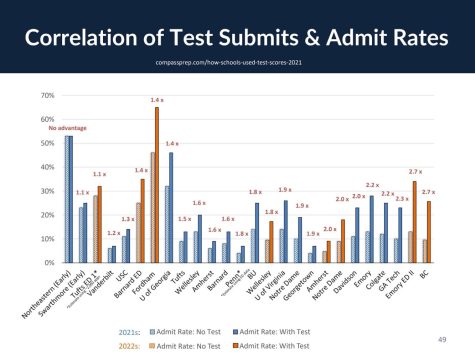
Carson Neuhausen | Sports Editor
September 26, 2024
Standardized testing seems to be experiencing a rebirth. More schools are reconsidering the value these exams bring to the admissions process. In the wake of the COVID-19 pandemic, many universities shifted to test-optional or test-blind policies, offering a reprieve to students struggling with access to standardized tests like the SAT and ACT. In recent years, however, standardized tests are coming back as the final equalizer.
One of the key drivers behind the resurgence of standardized tests is the need for a measurable, uniform standard in college admissions. Junior Luke Karidis said, “I think the tests are a good thing because they are a chance for me to stand out.” As grading systems and curricula at individual high schools further diverge from each other, colleges are in need of something to level the field. Standardized tests provide a common metric to evaluate applicants from different backgrounds. For those attending under-resourced schools or lacking access to advanced coursework, a strong test score can demonstrate academic potential that might not be evident from grades alone.

Yet, this rebirth of testing doesn’t come without its critics. Opponents argue that standardized tests disproportionately favor wealthier students who have access to test prep courses, tutors, and multiple test attempts. Junior Jack Blaney states that “the tests are unfair, you just have to be good at doing multiple choice fast to get a decent score, it doesn’t really represent intelligence.” This has reignited debates about equity and whether these exams should play such a central role in determining college futures.
However, the post-pandemic landscape offers a potential middle ground. Rather than solely relying on test results, schools are now balancing them with factors like extracurricular involvement, leadership, and community service, signaling a shift toward a more nuanced use of standardized tests.
As standardized testing evolves, its role in admissions may be more adaptable and equitable, reflecting the changing dynamics of higher education.

Leave a Reply